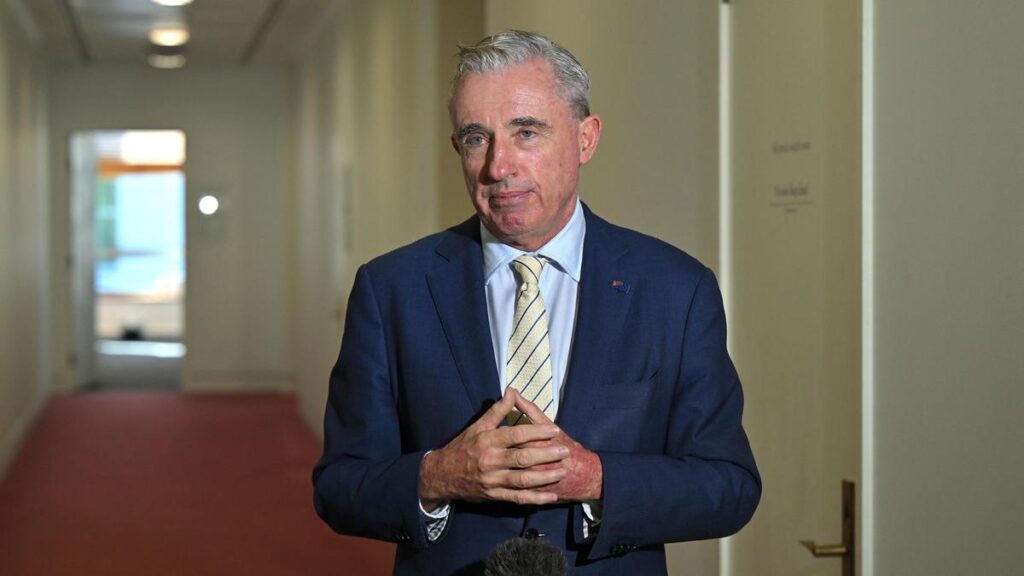
As the deadline for securing exemptions from the United States’ impending tariffs looms, Shadow Trade Minister Kevin Hogan has sharply criticized Prime Minister Anthony Albanese, accusing him of “waving a white flag” in trade negotiations. The criticism comes as countries like Britain and Vietnam have successfully negotiated trade deals, while others, including India, Japan, and the European Union, continue their discussions with the US.
Prime Minister Albanese, speaking at an economic forum on Friday, expressed skepticism about any changes to the tariffs by next week’s deadline. “I think he’s waving a white flag and I don’t know why he’d be saying that,” Mr. Hogan remarked in an interview with Sky on Sunday. He pointed out that several countries had managed to secure preferential terms, citing the UK’s partial exemptions on steel and aluminium tariffs, and similar arrangements for Mexico and Canada.
Global Trade Dynamics and Australia’s Position
The UK was the first to clinch a comprehensive agreement under the new tariff regime, maintaining a 10 percent base tariff on its exports to the US, with preferential terms in certain sectors. This stands in contrast to Australia’s current predicament. Historically, Australia has relied on a free trade agreement with the US to ensure tariff-free access for key exports. However, the introduction of President Trump’s 10 percent baseline tariff in April has disrupted this longstanding arrangement.
Countries that fail to secure agreements by July 9 will face the outlined tariffs, marking the end of a 90-day negotiation pause. On Friday, President Trump announced that he had signed “take it or leave it” tariff letters to 12 countries, set to be dispatched on Monday.
Defending Diplomatic Relations
Labor Minister Kristy McBain defended the Prime Minister’s diplomatic efforts, emphasizing the “warm and friendly” nature of three phone calls shared between Mr. Albanese and President Trump. She assured that a one-on-one meeting would be rescheduled, highlighting ongoing efforts to secure favorable trade deals for Australian exporters and primary producers.
“We’re working really hard with all of our trading partners to ensure that we’re getting good deals for our exporters, our primary producers, so that we can broaden our trade relationships with a range of countries,” Ms. McBain stated. She also addressed concerns about Mr. Albanese’s upcoming visit to Beijing, where he is set to meet President Xi Jinping, suggesting that Australia is not prioritizing its relationship with China over its key ally, the US.
“China’s one of our biggest trading partners. We’ve got a steady relationship with China now,” Ms. McBain noted, adding that approximately $20 billion in trade impediments had been removed due to improved communications over the past three years.
Strategic Alliances and Historical Context
Mr. Hogan underscored the importance of the US alliance, describing America as a crucial defense partner. “Given the importance of that country, not just on the economic relationship we have, but the national security relationship… it should be to all Australians,” he stated, referencing the ongoing review of AUKUS, a trilateral security pact between Australia, the UK, and the US.
This debate over trade and alliances follows a recent speech by Mr. Albanese, which invoked the wartime leadership of John Curtin. The Prime Minister marked the 80th anniversary of Curtin’s death by signaling Australia’s intent to chart its own course amid rising global uncertainties, reminiscent of Curtin’s historic pivot from Britain to the US during World War II.
Liberal MP Julian Leeser criticized Mr. Albanese’s handling of the US relationship, accusing him of “mucking up” the strategic partnership. “I think Mr. Albanese has really mucked up the relationship with the United States,” Mr. Leeser commented, suggesting that the Prime Minister had not done enough to strengthen Australia’s position in relation to the US.
Looking Ahead
The coming days will be critical for Australia as the tariff deadline approaches. The government faces mounting pressure to secure favorable trade terms with the US, while balancing its strategic and economic interests with other global powers. As diplomatic efforts continue, the outcome of these negotiations will have significant implications for Australia’s trade landscape and its position on the world stage.






